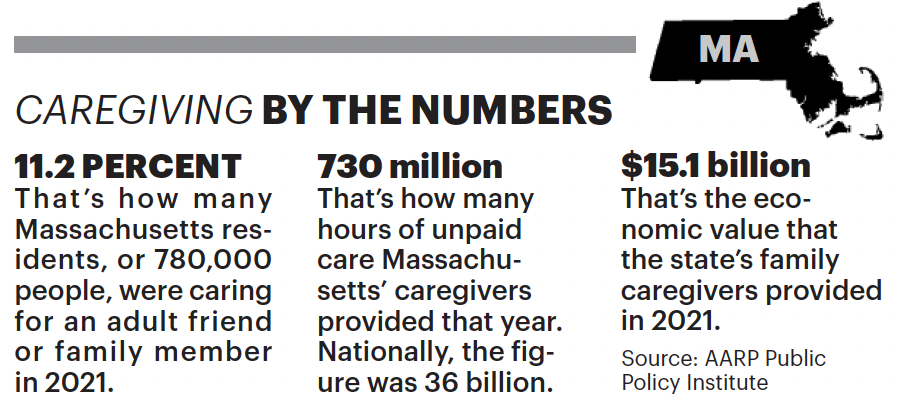AARP Hearing Center

When state Rep. Michael Kushmerek talks about the problems that family caregivers face, it’s not just about policy changes. For him, it’s also personal.
At 21, he went from enjoying late-night parties and cramming for college finals to juggling a full-time job and caring for his parents. Both his father, who struggled with substance abuse, and his mother, who faced lifelong mental health challenges, suddenly needed round-the-clock care and support services.
Kushmerek (D-Fitchburg) says the nearly 15 years he spent as his parents’ caregiver were “the most challenging years of my life.” At the time, his parents were divorced; his father was in his late 60s and his mother in her late 50s.
He knows he’s not alone. Massachusetts has an estimated 780,000 family caregivers, who in 2021 spent 730 million hours of unpaid time tending to their loved ones, according to AARP research.
“It’s a huge number,” says AARP Massachusetts State Director Jen Benson. “We want to make sure this work is recognized and supported.”

As part of that, AARP is aiming to increase awareness of the state’s paid family and medical leave program, through which most employees in Massachusetts are eligible to take up to 26 weeks of combined family and medical leave yearly while still earning a portion of their wages and protecting their jobs.
AARP will discuss the paid family leave program as part of a series of webinars on caregiving scheduled for November.
The group is also pushing for a comprehensive caregiver bill, which has been introduced by Kushmerek in the House and Jo Comerford (D-Northampton) in the Senate. The measure includes a tax credit for caregivers and protects them from job discrimination, among other provisions.
A RIGHT FOR WORKERS
The paid family leave program is funded by payroll withholdings and employer contributions; in 2025, the maximum weekly benefit, which comes from the state, is $1,170.64.
It offers three options for taking time off:
- Continuous leave, in which the worker takes all the allotted leave in one block.
- Intermittent leave, where the employee takes time off as needed, such as when a medical condition flares up.
- A reduced schedule, in which the person takes one or two days off per week over the leave period; that’s a boon for employees who need or want to continue to work.
The number of people seeking to take advantage of the benefit has increased by double-digit percentages each year since 2021, says Bill Alpine, director of the state Department of Family and Medical Leave. About 300,000 state residents, including more than 100,000 last year, have taken paid leave through the program since it began in 2021.
Of the applications approved last year, 21,054 — or 11.7 percent — were to care for a family member. The state doesn’t track the ages of family members being cared for, but Alpine says anecdotal evidence suggests it has “grown into being an avenue for caretaking for older family members.”
Before the family leave program was established, Kushmerek says, “A lot of people had to leave jobs because their employer couldn’t — or wouldn’t — give them the flexibility that is now a right of people in the workforce.”
Employees can take family leave for a serious personal health condition, to care for a family member with a serious health condition, to bond with a new child, or for a military service-related event. Health conditions, defined as physical or mental conditions that prevents workers from doing their jobs for more than three consecutive days, must be certified by a health care provider and meet certain other criteria.
Applications can be made through the online portal at mass.gov/DFML or by calling 833-344-7365.
By allowing people to stay in their homes instead of moving to long-term care facilities, Kushmerek says family caregivers provide a huge economic benefit to the state.
As for his own experience, “It was [more than] a decade of just trying to patch things together,” he says. That made him realize how much support caregivers need.
His bill would create a tax credit for family caregivers, expand respite care vouchers for middle-
income families and ensure that people who leave jobs to care for family members can collect unemployment. It would also make family caregivers a protected class against workplace discrimination and create a permanent council on family caregiving.
“It just makes it essential that we try to provide a little bit of relief,” he says.
For more information about the webinars and to find additional caregiving resources, visit aarp.org/caregivingma. ■
Hilary Appelman, a New York-based writer, covers long-term care and other issues. She has written for the Bulletin since 2011.
MORE ON CAREGIVING
- Find More AARP Resources for Caregivers
- How Unmarried Couples Can Plan for Caregiving
- 15 Tips for Talking to a Loved One with Dementia































































